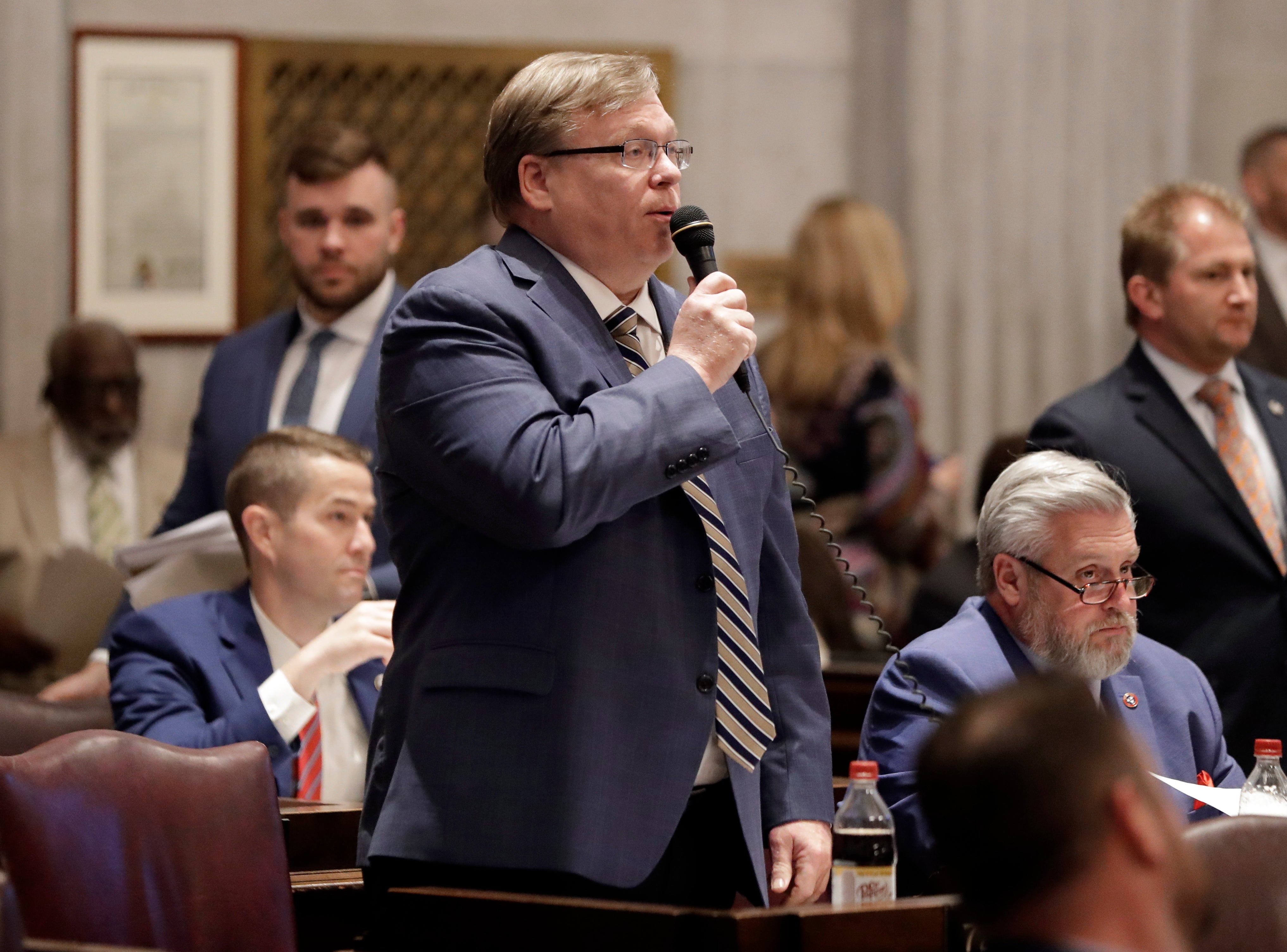Tennessee bathroom law sponsor now says it has penalties
The sponsor of Tennessee’s new law requiring businesses and government facilities to post signs if they let transgender people access their preferred, multi-person public bathrooms now says those who refuse could face up to six months in jail

The sponsor of Tennessee’s new law requiring businesses and government facilities to post signs if they let transgender people access multi-person public bathrooms of their choice now says owners and officials who refuse could face up to six months in jail — a penalty that went unmentioned during legislative hearings and debate.
The question of who would do the enforcing remains murky as well.
Republican Rep. Tim Rudd, who sponsored the bathroom sign bill, said a class B misdemeanor could apply to those who won't post the signs within 30 days of being warned they're breaking the law. That seems to contradict what Rudd told fellow lawmakers in March. He said then that the bill version that would become law “does not provide any fines or penalties at this point."
He has since argued that he was telling the truth because while the bill itself was silent about any penalty, it was inserted into a chapter of existing building code law that already penalizes a number of violations. This law broadly defines such violations as a class B misdemeanor for non-compliance with such things as smoke alarm requirements and air conditioning regulations. Such crimes are punishable by the jail time and a $500 maximum fine. The Chattanooga Times Free Press first reported on the criminal penalties.
The Tennessee law, approved with nearly all Republicans in both chambers in favor and almost all Democrats opposed, was signed by Gov. Bill Lee on May 17. It's one of five new state laws this year that have drawn backlash from LGBTQ advocates, including the Human Rights Campaign which decried the sign mandate as discriminatory and “offensive and humiliating.” The American Civil Liberties Union is recruiting businesses as possible plaintiffs in a likely lawsuit. The requirement begins July 1.
This week, Rudd said he did intend for the law to carry the criminal penalty and only “answered the question he was asked” during the committee meeting in March. When the AP asked him earlier this month about enforcement and penalties, Rudd did not mention the criminal penalties, saying district attorneys could ask a judge to force compliance and judges could seek “whatever judicial remedies the court deems appropriate" if a business won't post the signs, or people could file civil lawsuits.
In the March committee meeting, Rudd also said there would be “no state department overseeing this right now because there is no fine" and said it would be possible “someone could press charges, then it would be up to a sheriff and a DA to investigate.”
“So all the questions I got — 'does your bill provide any penalties?' — well, no, it’s already in code. I wasn’t asked that question,” Rudd told The Associated Press.
Democratic Rep. Bill Beck, who asked Rudd about what penalties would exist, said he misled his fellow lawmakers.
“It was a misleading statement to the entire, full State Committee, some 20 representatives,” Beck, who opposed the bill, told the AP. “Very discouraging to pass legislation with misleading answers.”
The misdemeanor penalty was only noted in a fiscal analysis of the bill from March that found there “will not be a sufficient number of Class B misdemeanor prosecutions" for governments to experience a significant financial impact.
The law requires that the following sign to be posted wherever transgender people are not prevented from using the multi-person bathrooms, locker rooms or changing rooms of their choice: “This facility maintains a policy of allowing the use of restrooms by either biological sex, regardless of the designation on the restroom.”
Rudd has rebutted arguments that the law is discriminatory, noting it doesn't require limits on bathroom accessibility.
“It really protects the transgender community because at least if it’s on the door when you go in and that’s the business’s policy at least you know what to expect,” Rudd said.
How the bathroom law will be enforced remains uncertain. Authorized enforcers of the building code it was inserted into include “all state officials, now having jurisdiction or as directed by the governor,” the state fire marshal, local fire prevention or building officials, the fire department chief, some mayors, and county officials.
Amy Weirich, president of the state District Attorneys General Conference, said last week that the group was neutral on the bill because it “doesn’t speak to anything having to do with enforcement” and had nothing to do with district attorneys. In a follow-up Wednesday, she noted the requirement's placement within building safety code.
“Most of those matters are handled by fire marshals and building inspectors,” Weirich, Shelby County's district attorney, said in a statement. "The processes in many areas involve reviews and re-inspections and appeals to various boards or administrative agencies. We will continue to look into the nuances of this public chapter and note the effective date is July 1, several weeks in the future.”
The state attorney general’s office says it doesn’t appear it has enforcement authority. Spokespeople for the governor’s office and the department that includes the fire marshal’s office didn’t immediately provide further explanation after requests for comment.
Nashville District Attorney Glenn Funk said his office “will not promote hate" and won't enforce the law.